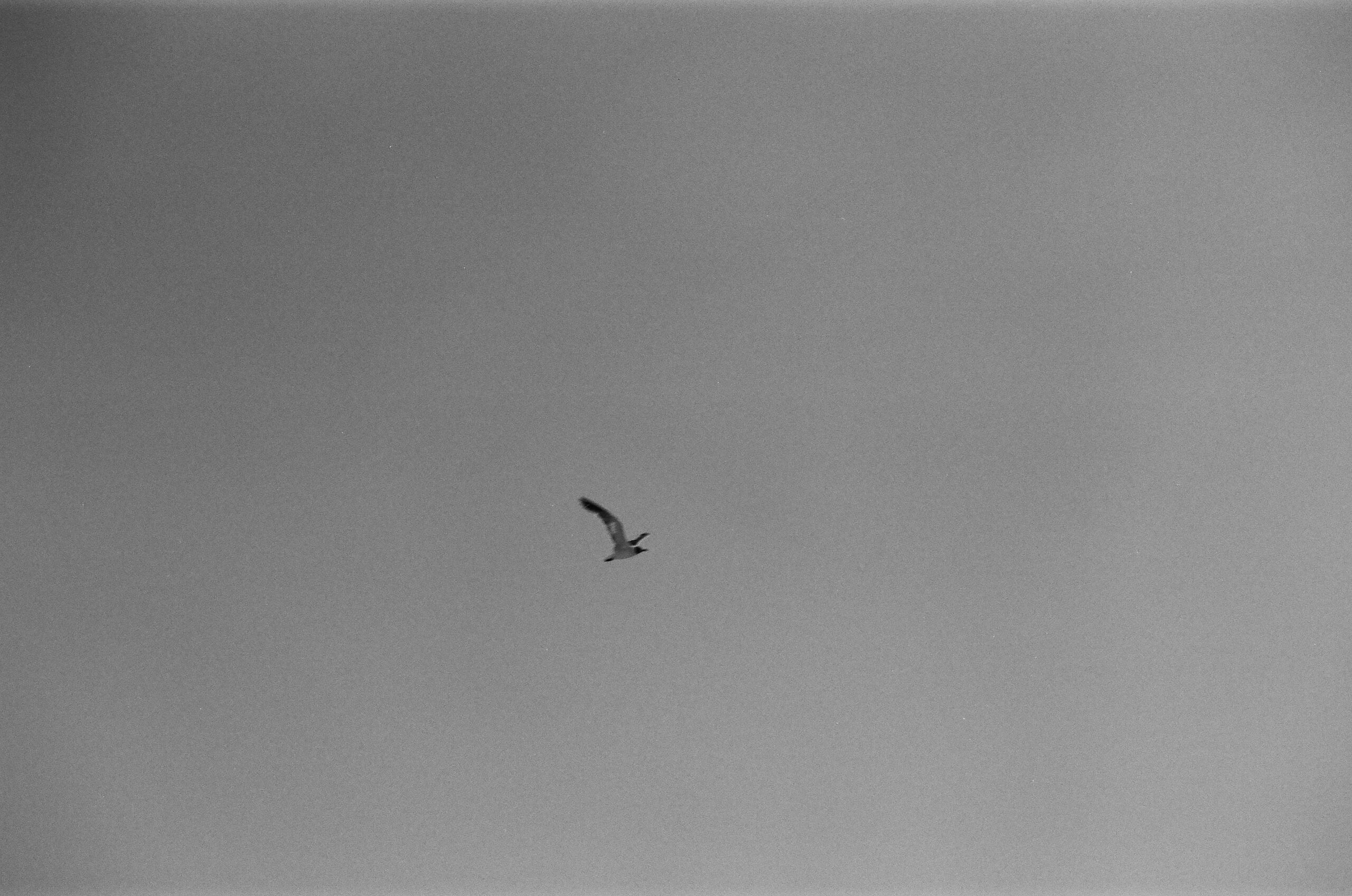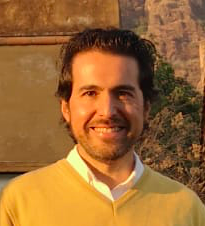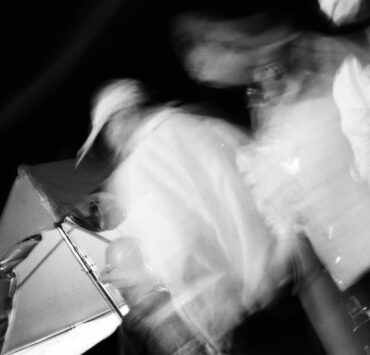
When she looked down at her husband the downpour had become a drizzle. Oltana didn’t know how to feel. She looked at the burns near his temple, the grey clothes that he wore every day, that seemed to have changed very little in color after he was struck by lightning.
The smell of burnt skin made her numb, disoriented, she knew she ought to be in shock. She felt the heaviness of her clothes, a light breeze making her shiver; she realized it was getting late. She felt her nipples hardened and crossed her arms, the way she used to do when Lazrim entered their room without knocking. Then she looked at the clouds overhead, horses and cherubs and full-bellied dwarfs, they seemed to be smiling at her. She felt the rain in her face, droplets pattering on her forehead, a trickle of water dripping down her chin.
After a moment she murmured to the sky: How did you know that’s what I wanted? There was one, maybe two lightning flashes in the distance, then she felt the power of it, the force of nature reverberating through her body.
She rolled her hair to one side and squeezed it, saw the falling drops distort the surface of the puddle near her feet. The earth had become darker, ready to be pregnant with life; she could smell clay and mule dung in the air. She decided to walk home and change her clothes, maybe eat a slice of rye bread before going to visit her sister.
With Lenka she would cook chicken gizzards and boiled cabbage, the stuffed peppers both of them liked, then she’d tell her how it’d happened, the miracle she’d been granted, because that’s what Lenka would also do, share her problems and worries with Oltana, the moments of frail intimacy with her husband Mihal, the insecurities that seemed to plague every Albanian man.
Oltana knew what would happen when she informed the elders about Lazrim’s death, the way they’d decide how she should be feeling, the words of insincere affection and pity, the unfelt grief followed by the orders. The sacrifice that would be expected of her.
The house where she lived had been built by her paternal grandfather, then inherited by her father, who had kept a room in it until his death. That was part of the agreement with Lazrim: her father could live with them but Lazrim would make all the decisions. The house would be owned by Lazrim and Oltana’s son, who would arrive in due time, when God chose to bless their marriage.
Walking down the hill, she stopped for a moment, hands on her waist, and admired the tree that stood a few feet away from the house, a towering elm that had always given her peace, its branches brushing against the brown-tiled roof. When they were children, she and Lenka had felt blessed to grow up near the tree, especially on hot summer days when it extended its branches over them like a biblical giant. In the evenings they had lain on the grass and smelled the fragrant wind of the night, eyes closed, and listened to the secrets whispered by the swinging branches. Both sisters had spoken to the tree, expressed their gratitude and laid gifts around it, mounds of sugar and wooden toys, the tree’s ancient roots surfacing like the arms of a mystical creature. Standing in the doorway their mother had watched them, cross-armed and smiling, and Oltana knew she was refraining from calling them in for bed, because she and her sister were in another world.
Oltana walked over and embraced the tree, put her ear on the bark. She felt the rugged surface against the skin of her jaw and earlobe, she stroked herself against it. (what did the tree feel like against her body, her ear?) She smiled and murmured something, words of affection. She sometimes thought it could feel Oltana’s heartbeat, perceive her emotions; it knew of her sorrows and joys, held memories of when she and Lenka were little. The tree had witnessed Oltana’s father’s childhood, her grandparents’ and great-grandparents’ too, generations of men and women plowing these lands. She pressed her lips to the bark.
Then she felt something, a vibration that came from the center of the tree and entered her body. She took a step back and looked at the branches. She heard a twig snap and turned her head; she felt an odd panic when she saw a man staring at her.
“Are you in love with a tree?”
She noticed the dark bluish stubble, the worn out beret that lay tipped forward on his head and close to his eyebrows.
“You’re all wet,” he said.
“Do I know you?” she asked.
“I’ve seen you before. You and your sister.”
She noticed the way his eyes were examining her body. She stooped her shoulders, crossed her arms and hid her breasts.
Theatening? menacing? Creepy?
“Lazrim,” she yelled, and raised her arm.
The man turned around.
“Lazrim,” she repeated.
“Maybe you know my husband?” she asked, then yelled again. “That’s him, over there.”
Far in the distance, the figure of a horse could be seen, someone riding on its back.
The man gave her one last stare, then walked into the forest.
She began to run towards the silhouette riding the horse but then thought no. It was safer to go towards her sister’s house. She thought of what lay ahead, the men that the elders would present to her as suitors, the face of infinite gratitude she would have to show them. She was a widow now. She stopped and leaned forward, rested her hands on her knees. She closed her eyes. What if she chose something else?
She arrived at Lenka’s house and knocked on the door. She turned her head and gazed at the landscape behind her, the young pines up the hill, the missing stones in the path; her footsteps were visible in the mud. A shiver ran up her spine; her throat hurt when she swallowed. She was about to knock again when the door creaked open and Lenka appeared in the doorway, her baby girl in her arms.
Lenka laughed a little, then covered her mouth with three fingers. “Were you rolling around in the mud like a hog?”
Lenka was holding the baby with both arms, twisted her torso to one side, then the other, and Curlina babbled something.
“I don’t know where to begin,” Oltana said as she leaned forward to kiss the baby on the crown. She smiled and thought of hugging her sister but her body was cold, her clothes wet; she did not want to touch the baby like that. She crossed her arms and cupped her elbows with her hands.
“Are you just going to stand there?” said Lenka. “Come on in.”
In the kitchen Lenka put water to boil, waited for her sister to put on dry clothes. She was carrying Curlina close to her chest. The baby giggled and reached out with her hands, she tried to grab Lenka’s hair in a fist.
Oltana shuffled into the kitchen wearing an oversized white gown. “Can I help with anything?” she asked. “Where’s Mihal?”
Lenka touched her sister’s hair. “It’s not dry yet. Let me go get another towel. You must be cold,” she said, and removed a strand of hair from her eyes. “Do you want some tea?”
“Lazrim’s dead.”
There was silence.
After a moment Lenka cleared her throat, then said in a low soft voice, “Do you want to tell me what happened? I’m beginning to worry.”
“I can’t say I’m innocent.”
Lenka gasped. “What have you done?”
“Doesn’t matter, I’ve made up my mind. I’ll take the oath.”
Lenka frowned.
“I’ll be free,” Oltana went on. “I’ll do whatever I want.”
“You’ll what? No, wait,” Lenka paused, examining her sister’s face. “Where is he now? Please tell me you didn’t –”
“He was hit by a stroke of lightning.”
Lenka sat back in her chair.
“I’ll take the oath and become a burrnesha,” Oltana went on. “I don’t care, I want the kind of life they have.” She leaned over the table. “That way I’ll be able to keep the house and you can come over, any time. Mihal will think twice before getting drunk now.” She placed her hand over Lenka’s and held it. “The way we always dreamed of.”
“The house,” Lenka repeated, she was smiling.
“We could lose it otherwise.”
“But what about – ”
“I don’t care about the vows,” Oltana said. “What? You think I’ll miss it? I never felt anything with Lazrim.” She tilted her head and pursed her lips. “I used to stare at the ceiling,” she went on. “I looked for the spider knitting its web. Then he was done.”
“There are other men. Different men.”
“Only Dad was different.” She was shaking her head. “Thanks but no thanks, I’m not interested.”
“What about children?”
“Children,” Oltana repeated, then fell silent. She kept watching a spot on the floor. She did not seem to blink.
After a moment Lenka stood up and touched her sister on the shoulder. “Are you hungry?” she asked. “There’s some pork with squash and green tomatoes, I know you love that. No, you sit. I’ll get it for you.”
Oltana sat cross-legged on the old kitchen chair, half-listening to what her sister was saying about Mihal and the trip he’d made to the city. She was thinking of the days to come, of the ceremony where she’d become a Sworn Virgin and receive the rights of a man. She wondered if it could be possible, that life. She could start smoking, even drink alcohol; she could do anything. Her life was about to change. She felt thrilled and excited and worried. What if it was not what she envisioned? There are other men, Lenka had said. Different men. What about children, her sister had asked. She did not want to think about any of that because she’d be able to keep the family’s house. She and her sister, living close to nature. She imagined herself with Lenka and Curlina seated under the old elm tree, eating a watermelon.
After she finished eating the stew, Lenka asked if she wanted to help bathe the baby.
Oltana rolled up her sleeves. “Let’s do it.”
They heated some water, then carried two full buckets to the small wooden hut that served as a bathroom outside. They poured the water into a wooden tub and Lenka touched it with her fingers. “It’s ready,” she said.
“No, it’s too hot,” said Oltana. “Let me stir it a little more.”
They sat Curlina on one side of the tub, Lenka holding her back and neck.
“Look at that tummy,” said Oltana. “I just want to squeeze it.”
“Do you know who she reminds me of at that age?”
Oltana laughed. “Yeah, right.”
Curlina kicked the water and Oltana shrieked, moved back but the front of her clothes got splashed. “Not again,” she said, smiling. “I just changed clothes.”
A knock on the door was heard, first timid, then louder.
“Hold her,” said Lenka, then walked to the door.
Over her shoulder, Oltana saw a woman, doubled over and with a cataract in one eye. She was murmuring something.
“I won’t be long,” Lenka said to Oltana.
She bathed Curlina with care, feeling the softness of her skin, and she talked back when Curlina babbled and giggled; she seemed to have plenty of things to say. They played for a while, spilling more water, Oltana squeezing the sponge over Curlina’s head. She noticed the water was not as warm and worried the baby could catch cold. Just a little longer, she kept telling herself.
When she put Curlina to bed, Oltana tucked the blanket under her chin. She looked at her hands, rosy and half-clenched, showing at the edge of the blanket. She listened to Curlina’s breathing, fast and irregular, and wondered if she’d ever regret her choice. She bent over and pressed her lips to the baby’s head, filled her lungs with her scent.
Downstairs she found Lenka washing the dishes. “What did the woman want?” asked Oltana.
Lenka stopped for a moment, then continued washing.
“Something’s wrong?” Oltana insisted.
“Half of the roof fell down,” she said. “The other caught fire.”
Oltana brought a hand to her mouth.
“Her son and grandchildren are safe,” Lenka went on. “But her husband has burns on the back and shoulders.”
“Will he be all right?”
“It will take him weeks to recover.”
“What about the house? Do they have somewhere to live?”
Lenka was drying her hands with a cloth. “She’s just grateful her husband survived,” Lenka said.
Oltana looked down at her lap. They were silent for a moment, then Lenka said, “Let’s go upstairs.”
That night it rained again, with thunder and lightning, but in her sleep Oltana didn’t hear any of it. In earliest morning she woke up rested, bright sunlight pouring in through the thin white curtains. She found her sister in the kitchen feeding the baby.
“Coffee?” Lenka asked.
Oltana nodded, then sat at the table. She blew over her cup but did not drink. “I need to go and talk to the elders,” she said.
“This early?”
“It’s important, didn’t you say so?” She stood up. “I’ll tell them everything.”
Lenka nodded, then walked with her to the door. Curlina held a wooden spoon in her hand and was waving it in the air; she brought it to her mouth in one quick movement.
At the door Oltana hugged her sister. After they let go of their embrace, Curlina giggled and Lenka squeezed her sister’s hand lightly, rubbed it with her thumb. “It’s not too late,” she said.
They regarded one another for a long moment. Then Lenka said, “Whatever you choose, it doesn’t matter. I’m here for you.”
Oltana bent over and kissed Curlina’s head, then walked away.
Outside the air was dry and cold. Scattered white clouds mottled the sky; they seemed to be drifting away without hurry. A breeze from the west stroked Oltana’s cheeks, her forehead. She thought of what the elders would ask, the reasons she’d have to give, all of them rehearsed in her mind. She recited the words she’d have to pronounce. Yes, I do. The river meandered and narrowed, then disappeared from view.
She convinced herself it was for the best. Lenka would have more children, beautiful all of them, and Oltana would be there to raise them, love them as if they were her own. She looked at the river once more. Let’s go. She walked on the stone path again.
Not far from her house an odor pricked her nostrils, a smell of burnt wood that made her feel dizzy; a slight pain above her stomach began to jab at her. She walked faster, her pace almost becoming frantic. When she saw the old tree, cracked through the middle and charred, she felt as if the air had been removed from her lungs, a shattering of membranes and ripping of organs. It deafened her. She looked up at the clouds and tried to scream but couldn’t.
She gazed at her house, unharmed by the storm, then at the tree, at the branches that now lay on the ground, some of them still crackling. She let herself fall to the ground and felt the pain in her knees, the rocks cutting her skin, and she gave a small cry, a muted howl of the soul. In the distance, purple grey clouds were moving beyond the mountains. The sky was turning blue.
~
END

Mauricio Ruiz is a novelist, translator, and cultural journalist. He was born in Mexico City and has lived in Norway, Belgium and the US. He’s been shortlisted for the Bridport and Fish Short Story Prizes, and received fellowships from OMI Writers (New York, US), Jakob Sande (Sunnfjord, Norway), Three Seas Council (Rhodes, Greece), Société des auteurs (Brussels, Belgium), and Can Serrat (Catalonia, Spain). His work has appeared in Words Without Borders, Electric Literature, The Common, The Rumpus, The Masters Review, Letras Libres, Gatopardo, among others. He has published two collections of short stories and is at work on his fourth novel. He’s currently a grad student in creative writing at the University of Iowa.







